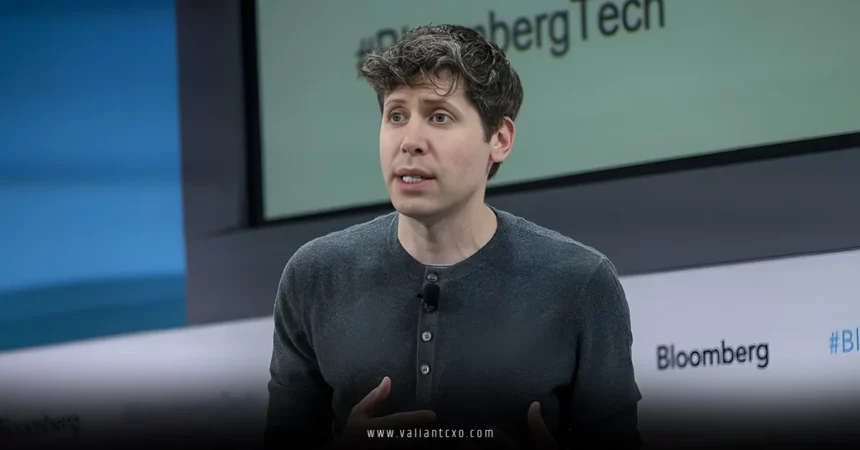Sam Altman is a name that resonates across the tech world, sparking curiosity and debate. Who is this guy, and why is everyone talking about him? As the CEO of OpenAI, Sam Altman has become a central figure in the artificial intelligence revolution, steering groundbreaking innovations like ChatGPT while navigating the ethical minefield of AI’s impact on humanity. This article dives deep into the life, achievements, and controversies surrounding Sam Altman, exploring why he’s both celebrated and scrutinized. Buckle up as we unpack the journey of Sam Altman, a man who’s shaping the future, one algorithm at a time.
Who Is Sam Altman? A Snapshot of a Tech Trailblazer
Ever wonder what makes someone a tech icon? Sam Altman, born April 22, 1985, in Chicago, Illinois, is a quintessential example. Raised in St. Louis, Missouri, in a Jewish family, he was tinkering with computers by age eight, taking apart Apple Macintoshes and teaching himself to code. This early curiosity wasn’t just a kid’s hobby—it was the spark of a lifelong passion for technology. Dropping out of Stanford University after two years, Sam Altman didn’t follow the conventional path. Instead, he dove headfirst into entrepreneurship, co-founding Loopt, a location-based social networking app, at just 19. Though Loopt didn’t become a household name, its $43.4 million acquisition in 2012 proved Altman’s knack for spotting opportunities.
What sets Sam Altman apart? It’s his blend of relentless optimism and calculated risk-taking. He’s not just a dreamer; he’s a doer who’s built a career on bending the world to his vision. From startup founder to venture capitalist to AI pioneer, Altman’s journey is a masterclass in seizing the moment. But let’s not get ahead of ourselves—how did he go from a college dropout to a global influencer?
Sam Altman’s Early Ventures: From Loopt to Y Combinator
The Loopt Experiment: A First Step into Startups
Imagine being 19, fresh out of college, and convincing investors to pour $30 million into your idea. That’s exactly what Sam Altman did with Loopt in 2005. The mobile app aimed to connect people based on their location—think of it as a proto-Foursquare. While it struggled to gain traction, its acquisition by Green Dot Corporation showed that Sam Altman knew how to turn vision into value. Failure? Not quite. It was a stepping stone that taught him resilience and the art of pivoting.
Leading Y Combinator: Shaping the Startup Ecosystem
By 2011, Sam Altman had joined Y Combinator (YC), the legendary startup accelerator that birthed companies like Airbnb and Dropbox. By 2014, he was its president, a role he held until 2019. Under his leadership, YC became a powerhouse, mentoring thousands of founders and funneling billions into startups. Altman’s philosophy? Take risks early, embrace curiosity, and don’t mimic the crowd. He once wrote, “If everyone else is starting meme companies, and you want to start a gene-editing company, do that.” His time at YC wasn’t just about funding startups; it was about cultivating a mindset of fearless innovation.
Sam Altman and OpenAI: Redefining Artificial Intelligence
Co-Founding OpenAI: A Mission for Humanity
Fast forward to 2015, and Sam Altman co-founded OpenAI alongside Elon Musk and others, with a bold mission: to ensure artificial general intelligence (AGI) benefits all of humanity. AGI, the idea of machines matching human cognitive abilities, sounds like sci-fi, but Altman saw it as the next frontier. OpenAI started as a nonprofit, but by 2019, Sam Altman spearheaded its transition to a capped-profit model to fund the astronomical costs of AI research. This move raised eyebrows—some saw it as mission creep, others as pragmatic genius. Either way, it secured a $1 billion investment from Microsoft, setting the stage for OpenAI’s meteoric rise.
The ChatGPT Phenomenon: A Game-Changer
If you’ve ever chatted with an AI that feels eerily human, thank Sam Altman’s OpenAI. In November 2022, they launched ChatGPT, which skyrocketed to 100 million users in just two months—the fastest product launch in tech history. ChatGPT isn’t just a chatbot; it’s a glimpse into a future where AI amplifies human potential. Sam Altman describes it as “AI from the movies,” fast, natural, and transformative. But with great power comes great responsibility—ChatGPT’s success thrust Sam Altman into a spotlight where every move is scrutinized.
Navigating Controversy: The 2023 OpenAI Drama
In November 2023, Sam Altman faced a whirlwind when OpenAI’s board briefly ousted him, citing vague concerns about transparency. The tech world gasped—how could the face of OpenAI be sidelined? Within days, employee backlash and external pressure led to his reinstatement. Altman called it a “learning experience,” noting that it strengthened OpenAI’s governance. This saga wasn’t just corporate drama; it highlighted the high stakes of AI leadership and Altman’s pivotal role in it. Can one person steer a technology that could reshape society? Sam Altman seems to think he can.
Sam Altman’s Vision: The Intelligence Age and Beyond
The Promise of Superintelligence
Sam Altman believes we’re on the cusp of the “Intelligence Age,” where AI will surpass human capabilities in ways that make fire or electricity look quaint. In his blog, he’s predicted superintelligence could arrive in “a few thousand days.” That’s not just bold—it’s mind-boggling. He envisions AI as a tool to amplify scientific discovery, boost productivity, and create a world of “massive prosperity.” Picture a future where your personal AI team handles tasks from coding to creative writing. That’s the dream Sam Altman’s chasing, but he’s not blind to the risks.
Balancing Utopia and Dystopia
Altman’s not just a tech cheerleader; he’s a realist who acknowledges AI’s darker side. From disinformation to job displacement, he’s candid about the challenges. He’s warned that AI could personalize propaganda in ways that make today’s troll farms look amateur. Yet, he remains optimistic, believing responsible deployment can tip the scales toward abundance. His analogy? AI is like a double-edged sword—wield it wisely, and it’s a tool for progress; swing it recklessly, and it’s a disaster waiting to happen. Sam Altman’s challenge is ensuring OpenAI stays on the right side of that blade.
Investments and Influence: Sam Altman’s Broader Impact
A Portfolio Powerhouse
Sam Altman’s influence extends beyond OpenAI. His investment portfolio spans over 100 companies, including heavyweights like Reddit, Stripe, and Neuralink. His 8.7% stake in Reddit gives him more voting power than its CEO, showcasing his knack for strategic bets. Sam Altman also backed Helion Energy and Oklo, clean energy firms pushing for a sustainable future. Then there’s Worldcoin, a controversial project aiming to verify human identity through eye scans in exchange for cryptocurrency. Love it or hate it, Sam Altman’s investments show he’s not afraid to bet on bold ideas.
A Global Stage: From Bilderberg to Golden Visas
Sam Altman’s clout isn’t confined to Silicon Valley. He’s a regular at the Bilderberg Meeting, rubbing shoulders with global elites. In 2023, Indonesia granted him its first “golden visa,” a 10-year border pass, recognizing his influence. Time magazine named him one of the 100 most influential people in 2023 and 2024, and CEO of the Year in 2023. Why? Because Sam Altman isn’t just building tech—he’s shaping how the world thinks about it.
The Personal Side of Sam Altman: Beyond the Tech Titan
A Life of Curiosity and Altruism
What’s Sam Altman like when he’s not revolutionizing AI? He’s a voracious reader, diving into economics, political theory, and sci-fi like Iain Banks’ Culture series. He’s an advocate for effective altruism, a movement using evidence to maximize impact. Despite his wealth—estimated at $1.8 billion in 2025—he claims money isn’t his driver. After his 2023 OpenAI ousting, he spoke of a “recompilation of values,” prioritizing relationships and purpose over status. Married to engineer Oliver Mulherin, Altman splits his time between San Francisco and Napa, with a prepper streak that includes stockpiling gold and guns for worst-case scenarios.
The Contradictions of a Visionary
Sam Altman’s not without critics. Some call him a hype machine, dazzling world leaders while downplaying AI’s risks. Others question his nonprofit-to-for-profit pivot at OpenAI, seeing it as a betrayal of its mission. Posts on X have labeled him everything from a savior to a “dangerous” figure, accusing him of prioritizing profit over safety. Yet, Sam Altman’s supporters argue his optimism and risk-taking are exactly what drive progress. He’s a walking paradox: a shy introvert with a “delusional level of self-confidence,” a dreamer who’s also a prepper. Isn’t that what makes him so fascinating?
Sam Altman’s Ethical Stance: Navigating AI’s Moral Maze
Championing Responsible AI
Sam Altman doesn’t shy away from AI’s ethical dilemmas. He’s called for regulation to prevent misuse, like AI-driven bioweapons or election interference. At a 2023 Senate hearing, he advocated for policies balancing innovation and safety. His mantra? AI should empower, not endanger, humanity. But critics argue OpenAI’s lack of transparency—its name suggests openness, yet its research is increasingly guarded—undermines this. Sam Altman walks a tightrope, pushing for progress while pleading for caution.
Universal Basic Income: A Safety Net for an AI World
Worried AI might make jobs obsolete? So is Sam Altman. He’s a proponent of universal basic income (UBI), arguing it could unleash human potential by freeing people to take risks. His Worldcoin project ties into this, aiming to distribute cryptocurrency as a form of UBI. It’s a bold idea, but privacy concerns and ethical questions linger. Can Sam Altman’s vision of abundance truly include everyone, or will it widen existing gaps? That’s the million-dollar question.
Why Sam Altman Matters: A Legacy in the Making
Sam Altman isn’t just a tech CEO; he’s a catalyst for a new era. His work at OpenAI has made AI accessible, from students using ChatGPT for homework to developers building apps on its platform. His investments are shaping industries, from clean energy to biotech. But his legacy hinges on whether he can deliver on his promise: a world where AI amplifies human potential without tipping into chaos. Love him or question him, Sam Altman’s influence is undeniable. He’s not just building tech—he’s building the future.
Conclusion: Sam Altman’s Bold Bet on Humanity
Sam Altman’s journey—from a curious kid dismantling computers to the CEO of OpenAI—is a testament to what happens when vision meets action. He’s taken risks, faced controversies, and emerged as a defining figure in the AI revolution. With ChatGPT, he’s shown us AI’s potential to transform lives; with his investments, he’s betting on a sustainable, innovative future. Yet, the ethical challenges of AI loom large, and Sam Altman’s role in navigating them will shape his legacy. As we stand on the brink of the Intelligence Age, one thing’s clear: Sam Altman’s not just shaping technology—he’s challenging us to rethink what it means to be human. So, what’s next for this tech titan? Only time will tell, but one thing’s for sure: the world’s watching.
FAQs About Sam Altman
1. Who is Sam Altman, and what is he known for?
Sam Altman is the CEO and co-founder of OpenAI, renowned for leading the development of ChatGPT and advancing AI research. He’s a key figure in the AI boom, known for his entrepreneurial ventures and investments.
2. What was Sam Altman’s role at Y Combinator?
Sam Altman served as president of Y Combinator from 2014 to 2019, mentoring startups and shaping the tech ecosystem by funding companies like Airbnb and Dropbox.
3. Why was Sam Altman briefly ousted from OpenAI?
In November 2023, Sam Altman was temporarily removed as CEO by OpenAI’s board due to concerns about transparency. Employee support and external pressure led to his swift reinstatement.
4. What are some of Sam Altman’s notable investments?
Sam Altman has invested in over 100 companies, including Reddit, Neuralink, and Helion Energy. His 8.7% stake in Reddit highlights his significant influence in tech.
5. How does Sam Altman view AI’s future?
Sam Altman believes AI will usher in an “Intelligence Age,” amplifying human potential but requiring careful regulation to mitigate risks like disinformation and job displacement.
Read More:valiantcxo.com


